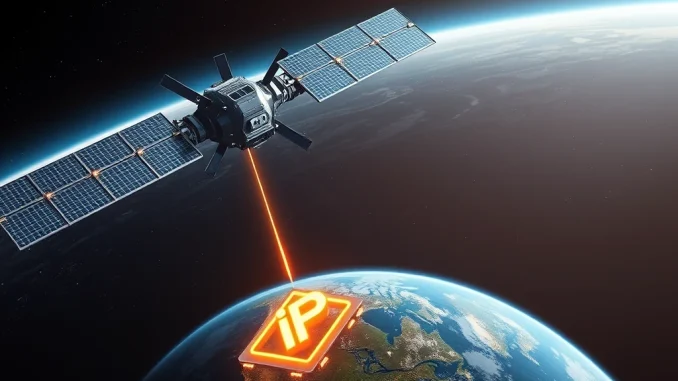
Imagine a future where sending data across vast distances, even from space, is faster, more reliable, and resilient. This isn’t science fiction; it’s becoming reality thanks to a groundbreaking collaboration. The crypto world often focuses on finance, but the underlying technology, like the InterPlanetary File System (IPFS), has far-reaching applications. A significant step forward has been made as the Filecoin Foundation and Lockheed Martin Space successfully tested a version of IPFS for transmitting satellite data from orbit.
Why is Reliable Satellite Data Transmission So Crucial?
Satellites are essential for everything from weather forecasting and GPS navigation to scientific research and global communication. However, transmitting data to and from space faces unique challenges:
- Distance and Delay: The sheer distance causes significant latency.
- Interference: Signals can be disrupted by atmospheric conditions or other transmissions.
- Hardware Limitations: Satellite hardware operates in harsh environments (radiation, extreme temperatures) and has limited processing power and storage compared to ground systems.
- Radiation Effects: Cosmic and solar radiation can corrupt data bits during transmission or storage.
Traditional data transfer methods, often relying on location-based addressing (like HTTP), can be inefficient when connections are intermittent or data is corrupted. If a specific file is requested from a location and that location is unavailable or the data is damaged, the request fails.
How Does Filecoin IPFS Offer a Solution?
The Filecoin Foundation, which supports the development of Filecoin and IPFS, partnered with Lockheed Martin Space in 2022 to explore decentralized storage solutions for space. IPFS, the InterPlanetary File System, is a distributed system for storing and accessing files.
Its key advantage lies in its content-based addressing. Instead of requesting a file based on *where* it’s stored (like a specific server address), you request it based on *what* it is (its unique cryptographic hash). Here’s why this is revolutionary for space communication:
- Resilience to Disruption: If one node (or satellite/ground station) holding the data is unavailable, the system can retrieve the data from another node that has a copy of the same content. This is vital for intermittent satellite links.
- Data Integrity: Because data is addressed by its content hash, any corruption changes the hash, immediately indicating data damage. This protects against radiation-induced errors.
- Efficiency: If multiple users (or ground stations) need the same data, they can retrieve it from the nearest available node that has it, rather than all requesting it from a single distant source.
- Reduced Redundancy: If the same file exists on multiple systems, IPFS recognizes it by its hash and only needs to store it once across the network, potentially saving valuable storage space on satellites or ground systems.
The Successful Test: Bringing Distributed Storage to Orbit
The recent test involved deploying a version of IPFS adapted for the specific constraints and environment of space onto a satellite orbiting Earth. The successful transmission of data using this IPFS instance validated the potential for content-based addressing and distributed data retrieval in an orbital environment. This moves beyond theoretical discussions and demonstrates practical application.
This partnership between a major aerospace company like Lockheed Martin Space and a blockchain-related foundation like Filecoin Foundation highlights a growing interest in leveraging decentralized technologies for critical infrastructure, including space assets.
What Are the Implications and Future Possibilities?
This successful test opens up numerous exciting possibilities:
- More Robust Satellite Networks: Future satellite constellations could form a distributed network where data is stored and accessed more reliably.
- Inter-Satellite Communication: Satellites could potentially share data directly using IPFS, reducing reliance on ground stations.
- Deep Space Missions: For missions to the Moon, Mars, or beyond, where communication windows are limited and delays are extreme, IPFS could provide a more efficient way to store and retrieve scientific data.
- Earth Observation Data: Making vast amounts of satellite imagery and environmental data more accessible and resilient to disruption.
While promising, deploying and scaling such systems in space also presents challenges, including adapting software for radiation-hardened hardware, managing decentralized networks in a space environment, and ensuring security against novel threats.
Conclusion: A Giant Leap for Space Data
The collaboration and successful test by the Filecoin Foundation and Lockheed Martin Space mark a significant milestone. By demonstrating the viability of Filecoin IPFS for satellite data transmission, they are paving the way for a new era of more resilient, efficient, and reliable space communication. This initiative showcases how decentralized technologies, often associated with cryptocurrencies, can provide innovative solutions to complex problems in critical sectors like aerospace, ultimately benefiting everything from scientific discovery to global connectivity through advanced distributed storage methods.



